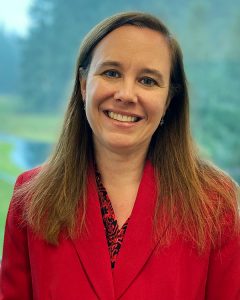Laura Watson Reflects on Social Justice Work, Sets Sights on EJ, Climate, & Nutrients

What sparked your interest in environmental protection?
Nature is where I feel most at peace. Whenever I’m casually strolling through the woods, chugging up a steep slope in the Cascade Mountains, or watching our iconic salmon return upstream to spawn, I can clear my mind and be in the moment. Our natural areas are precious. I feel compelled to do my part to protect and restore them for the benefit of future generations.
What past jobs prepared you best for your current agency role?
I served as an Assistant Attorney General for 21 years prior to becoming Director of the Department of Ecology. For 16 of those years, Ecology was my primary client. During that time, I worked on the entire range of issues faced by our agency. Among other things, I negotiated consent decrees for the cleanup of contaminated sites, defended against challenges to agency permits and enforcement actions, and helped the agency develop strategies for reducing greenhouse gas emissions. This gave me a solid grounding in the wide range of issues that Ecology deals with on a daily basis.
Prior to becoming a lawyer, I worked at a women’s homeless shelter. After becoming a lawyer, I continued my involvement in poverty issues by providing pro bono legal assistance to low-income individuals and sitting on boards that addressed poverty and homelessness in the community. This social justice work helped exemplify for me our special role as public servants in addressing the needs of our most vulnerable communities. In the environmental arena, this takes the form of environmental justice (EJ).
What are your top priorities?
In my prior answer, I mentioned EJ. This is a huge priority for me. My agency is committed to factoring EJ considerations into all aspects of our decision-making, from how we award grants to where we direct our enforcement resources.
Climate change is another big priority. We are pursuing various measures to reduce greenhouse gases such as finalizing a rule to phase out hydrofluorocarbons (HFCs), helping to implement Washington’s 2019 Clean Energy Transformation Act, and beginning a rulemaking process to adopt California’s zero emission vehicle standards.
We’re also working on climate change adaptation strategies, such as developing water solutions for farms, fish, and people. Climate change will impact Washington’s water supplies due to decreased snowpack in the mountains and changes in precipitation patterns. We’re working on measures throughout the state to increase water storage while simultaneously increasing stream flows to protect salmon and other aquatic species.
In the water quality realm, a top priority is the reduction of excess nutrient pollution in Puget Sound, one of our nation’s largest estuaries and a boon to our way of life in the Pacific Northwest. We’re in the process of developing a general National Pollutant Discharge Elimination System permit for wastewater treatment plants that discharge into the Sound. We’re also studying the extent to which other sources of nutrients are contributing to the problem with the goal of creating strategies to address those other sources.
What’s your proudest agency accomplishment?
I’m very proud of the HFC phase-out rule that was finalized on December 14 of this year. I’m also proud that we issued first-ever temperature standards in our 401 certifications for federal dams on the Snake and Columbia Rivers. Although the Army Corps is challenging those 401 certifications in court, we feel confident that they’ll ultimately be upheld and will be an important tool for addressing temperature pollution in these critical rivers that support salmon, Native American tribes, and local communities.
How would you describe your management style?
As a manager, I seek to learn from others and really listen to their input. Decisions benefit from robust discussions where all viewpoints are heard. I want people to feel empowered to speak up when they think I’m headed in the wrong direction on a decision. I may not always agree, but I will always listen with an open mind.
I have a lot of confidence in Ecology’s executive leaders, managers, and staff. This means that I place faith in the decisions they make, day in and day out. Although the buck ultimately stops with me as the ultimate decision maker for the agency, the majority of our agency’s decisions are not made at my level. I’m okay with that because the agency is staffed with excellent people who exercise sound judgment.
Where’s the first place you’ll travel when the pandemic is over?
We promised my mother that we’d take her to Ireland and Scotland for her 75th birthday. It may need to wait until she turns 76, but we still plan to take her! Because she lives in Pittsburgh, my family hasn’t seen her since 2019, and I miss her deeply.